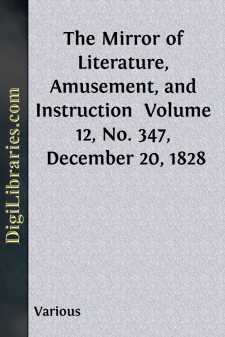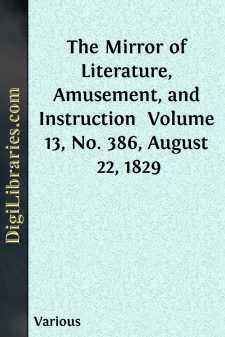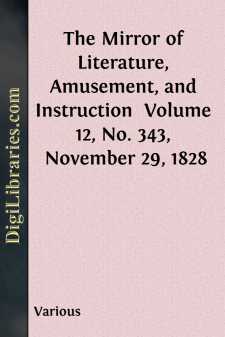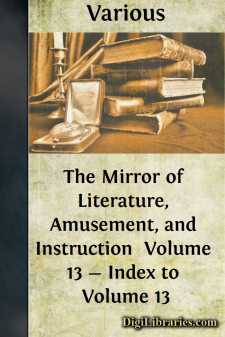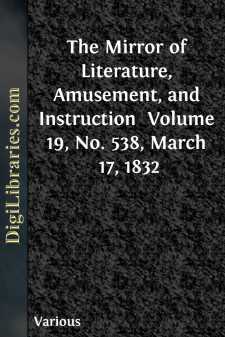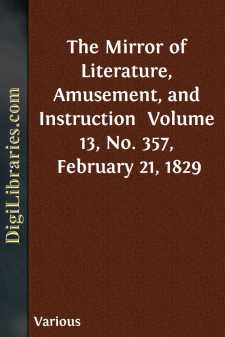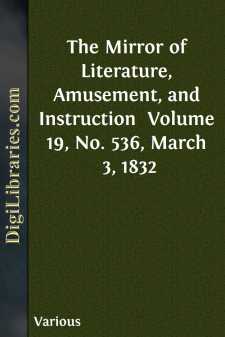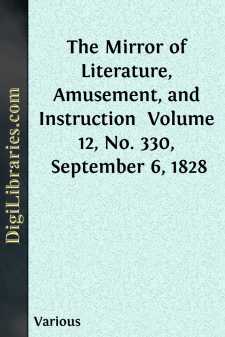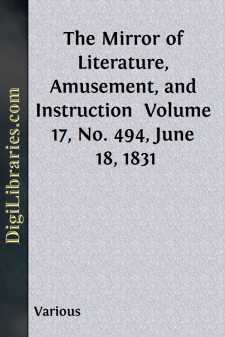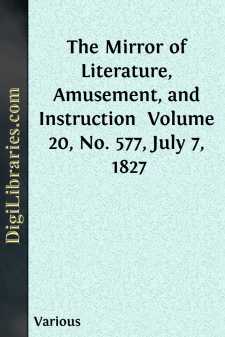Periodicals
- Art 27
- Children's periodicals 59
- Entertainment 5
- Food/Wine 2
- Games/Humor 455
- General
- Health 1
- History 53
- House/Home 1
- Regional 62
- Science/Nature 118
- Transportation 10
General Books
Sort by:
by:
Various
EUROPEAN CITIES.—NAPLES. In our last volume we commenced the design of illustrating the principal Cities of Europe, by a series of picturesque views—one of which is represented in the above engraving. Our miscellaneous duties in identifying the pages of the MIRROR with subjects of contemporary interest, and anxiety to bring them on our little tapis—(qy. Twopence?)—will best account for the...
more...
by:
Various
ST. PETER'S CHURCH, PIMLICO. The engraving represents the new church on the eastern side of Wilton Place, in the Parish of St. George, Hanover Square. It is a chaste building of the Ionic order, from the designs of Mr. Henry Hakewill, of whose architectural attainments we have frequently had occasion to speak. The plan of St. Peter's is a parallelogram, placed east and west, without aisles;...
more...
by:
Various
THE ADMIRALTY-OFFICE. The Admiralty Office, Whitehall, has few pretensions to architectual beauty. It is, however, to use a common phrase, a commanding pile, and its association with Britain's best bulwarks—her NAVY—renders it an interesting subject for representation. The Admiralty-office adjoins to the north side of the Horse Guards, and was erected by Ripley, in the reign of George II., on...
more...
by:
Various
MEMOIR OF SIR HUMPHRY DAVY, BART. The present may be regarded as a chemical age; for so extensive, rapid, and important have been the late acquisitions in the science of chemistry, that we may almost claim it as the exclusive discovery of our own times. The popularity and high estimation in which it is held may be ascribed to three causes: 1. The satisfaction which is afforded by its results. 2. Its...
more...
by:
Various
THE ARBALEST, OR CROSS-BOW. THE ARBALEST, OR CROSS-BOW. The Bow would appear to have been in most ancient nations the principal implement of war; and to keep alive this "mystery of murder," archery, or the art of shooting with a bow and arrow, seems to have been a favourite pastime in days of peace. In no country, however, has archery been more encouraged than in this island; wherefore the...
more...
by:
Various
WARWICK CASTLE. The history of a fabric, so intimately connected with some of the most important events recorded in the chronicles of our country, as that of Warwick Castle, cannot fail to be alike interesting to the antiquary, the historian, and the man of letters. This noble edifice is also rendered the more attractive, as being one of the very few that have escaped the ravages of war, or have defied...
more...
by:
Various
Manchester is distinguished among the large towns of the kingdom for its majority of enlightened individuals. "The whole population," it has been pertinently observed by a native, "seems to be imbued with a general thirst for knowledge and improvement." Even amidst the hum of its hundreds of thousand spindles, and its busy haunts of industry, the people have learned to cultivate the...
more...
by:
Various
WHY ARE NOT THE ENGLISH A MUSICAL PEOPLE? We cannot help it.—Massinger's Roman Actor. Astronomy, music, and architecture, are the floating topics of the day; on the second of these heads we have thrown together a few hints, which may, probably prove entertaining to our readers. The English are not—you know, reflective public—a musical people; this has been said over and over again in the...
more...
by:
Various
EXETER HALL, STRAND. We rejoice to see the site of Burleigh House partly occupied by the above Building. Its object is to afford accommodation for the meetings of Philanthropic Societies—so that whatever may be the olden celebrity of the spot, it is reasonable to expect that its present appropriation will be associated with the most grateful recollections. This building is, perhaps, the most perfect...
more...
by:
Various
DOMESTIC ANTIQUITIES. The first of these archæological rarities is a pair of Snuffers, found in Dorsetshire sixty-four years since, and engraved in Hutchins's history of that county. They were discovered, says the historian, "in the year 1768, in digging the foundation of a granary, at the foot of a hill adjoining to Corton mansion house (formerly the seat of the respectable family of the...
more...


